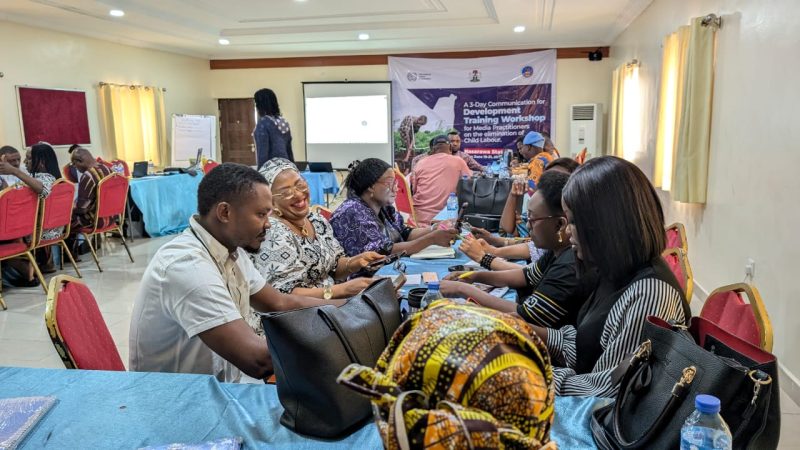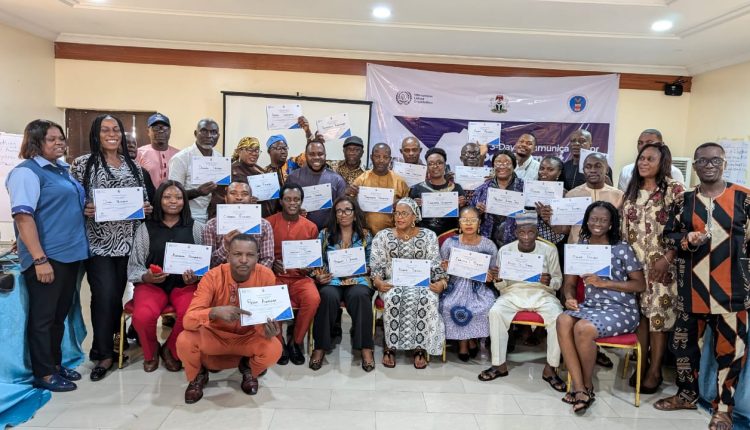The International Labour Organisation, ILO, has challenged the Media to lead the campaign against child labour in Nigeria and beyond.
The Organisation said this at a three-day capacity building workshop organised for media practitioners in Akwanga, Nasarawa State in North-central Nigeria, under the Action Against Child Labour in Agriculture in West Africa ACLAWA Project. The United States Department of Labour supported the workshop.
The ILO Project Director, ACLAWA, Dr Agatha Kolawale said the training is to empower Journalists to report child labour issues from point of knowledge.

She said; “We expect to see very effective and impactful human centred stories that would actually reflect child labour that would actually appeal to the conscious and also the head of the community for an effective change.”
Article 2, Paragraph 1 of ILO Convention 138 of 1973, which deals with Minimum Age for Work, states that each Member which ratifies the Convention shall specify, in declaration appended to its ratification, a minimum age for admission to employment or work….
The same Article in Paragraph 3, states that “The minimum age specified in pursuance of paragraph 1of this Article shall not be less than the completion of compulsory schooling and, in any case, shall not be less than 15 years”.
The 2021 Global child labour report released by ILO and UNICEF indicated a global increase of child labour prevalence by 8.4 million to 160 million. This marks the first slowdown in global efforts against child labor in two decades, with Sub-Saharan Africa facing particularly daunting challenges.
Of particular concern, the Report shows, is the significant increase in child labor among children aged 5 to 11 years, now comprising over half of the global total. Additionally, the number of children aged 5 to 17 years engaged in hazardous work has risen.
In a message to the three day capacity building workshop for Journalists, the Country Director of the ILO Office for Nigeria, Ghana, Liberia and Sierra Leone, Dr Vanessa Phala, said that globally, the agriculture sector accounts for 70% of child laborers.
Dr Phala said; “Shockingly, nearly 28% of children aged 5 to 11 years and 35% aged 12 to 14 years in child labour are out of school. You may say these are global data and may not reflect the realities in Nigeria.
“I am pleased to inform you that on the 18th of April 2024, Nigeria Bureau of Statistics launched the Nigeria Child labour survey report conducted in 2022. The launched report corroborates the global trend.
“The total number of Children aged 5- 17 years accounted for in 2022 are 62,900,479. 24,673,485 children that is 39.2% of the total number of children are in child labour and14,390,353 (22.9%) Children are in hazardous work.”
“Nationally we have more boys (12,689,663) than girls (11,983,822) exploited in the work place, however if accessed by place of residence, we have more girls victims in the urban and more boys in the rural areas.
“We have 30% of the population of children age 15-17 that are out of school and 22.4% of children age 5-14 are out of school” she said.
Represented by Dr Agatha Kolawale, Dr Vanessa said that this increasing trend in child labour is the reason that the ILO is investing and partnering with the media towards creating more awareness and advocacy where necessary to fight the menace.

Nigeria has however said that it has made giant strides in addressing the issue through the ratification of ILO Conventions 138 on the minimum age for work, 182 on the worst forms of child labour, 29 and 105 on abolition of forced labour.
Director, Inspectorate Department, Federal Ministry of Labour and Employment, Mrs Olaitan Olaolu represented by the Head of the Child Labour Unit in the Department, Mrs Tessy Odoh said that child labour remains a significant issue in Nigeria in the various sectors of the economy particularly in Agriculture and Mining.
These sectors she said, often employ children in hazardous conditions, depriving them of education, and exposing them to physical and psychological harm.
“This training workshop aims to equip the media with the knowledge and necessary tools in the elimination of child labour, through awareness raising, promotion of children’s right, advocacy and policy implementation by all stakeholders.
“The recent Nigeria child labour and forced labour survey 2022 showed that 6 out of 10 children are engaged in child labour and the global statistics indicate that 160 million children, nearly 1 in 10 worldwide are engaged in child labour, and about 60% of all child labourers in the age group 5-17years work in Agriculture and the global supply chains, including farming, fishing, aquaculture, forestry, and livestock.
“This amounts to over 98 million girls and boys. It is a global menace that has proved to potentially hinder the development of children, leading to lifelong physical and psychological damage, and keeping the children out- of- school, thereby perpetuating poverty across generations”, she said.
According to her, the 1999 Constitution of the Federal Republic of Nigeria, as amended prohibits forced and compulsory labour for any employee and also defines penalty fees, fines, imprisonment, or a combination of these sanctions for any employer found guilty.
Other conscious efforts Nigeria made towards addressing child labour she said include and not limited to “The review and validation of all relevant laws, regulations and policies that are key and instrumental to the elimination of child labour, the National Policy on Child Labour and the National Action Plan for the elimination of Child Labour for an implementation period of 5 years.
“Others are, the National Action Plan which she said “was adapted into State Action Plan (SAP) in 8 States in the first instance -: Oyo, Ogun, Lagos, Ondo, Osun, Niger, Enugu and Kwara States, respectively, in collaboration with the ILO, through the ACCEL Africa Project Phase I; the development and presentation of of 10 community Action Plan in Ondo , to the authorities of Ondo State Government, May 2024, in collaboration with the ILO through the ACLAWA project; the Compendium of Legal Framework on the elimination of Child Labour and Protection of Children in Nigeria; ▪ The review of the Labour Standard Bill to mainstream child labour, with special consideration on the adoption of 15 years as the minimum age for work / employment.”
During the training, participant were taken through topics like “overview of Child Labour/Forced Labour, Government Attempts/Policies for the Elimination of Child Labour, Group Work on Eliminating Child Labour in Nigeria: What Role for the Media, and Investigating and Writing Human Interest Stories in the Quest to Eliminate Child Labour”, among others.
At the end of the training, participants drawn from different media organisations said they were leaving energised, with renewed zeal and understanding of issues around Child Labour.
Mercy Chukwudiebere

